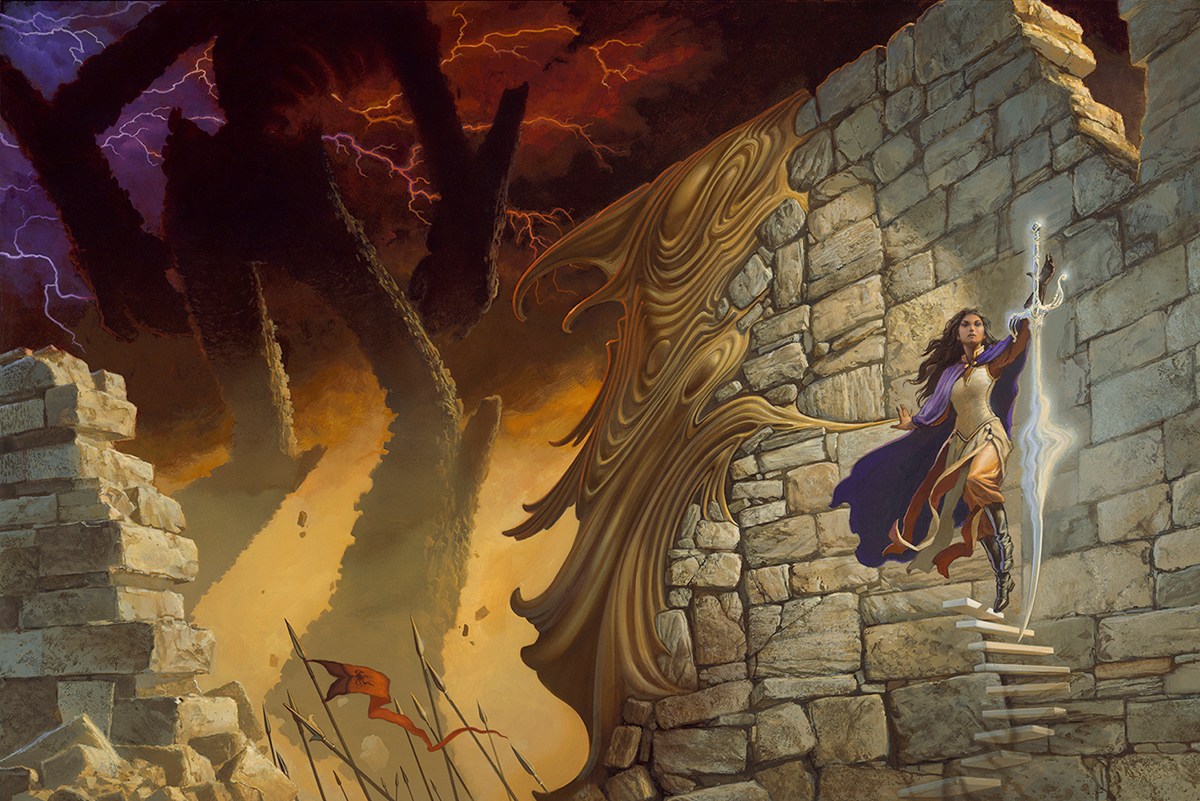
Oathbringer is, by far, one of the best books I have ever read. And I don’t mean that just because it has cool magic and a nifty world (although that is also very true). If you’re reading this, then hopefully you know about The Way of Kings and Words of Radiance. While those books are amazing in their own rights, Oathbringer was a book I needed to read. It spoke to me, much like Vasher’s sword spoke to him (only with less references to destroying evil and killing things).
I have always loved Brandon Sanderson’s books. They’re fun, exciting, and paint a world–cosmere, even–that would put the Marvel universe to shame a hundred times over. The Way of Kings was an epic journey. Words of Radiance expounded on that journey by amplifying the magic, delving deeper into the characters, and revealing more about the world and the lore associated with it.
Oathbringer took everything I love about the former two books, pumped it full of stormlight, and detonated it into an intense, high-stakes battle for not just Roshar, but for the very souls of the characters themselves. We got to know the characters–Kaladin, Dalanar, Shallan, Teft, and others–in the previous books, but it was within Oathbringer that we didn’t just learn about them, we felt with them. We felt their pains, their sorrows, and their failures. We jumped for joy with them in their successes, heaved a sigh of relief when things turned out well for them, and cried with them during their most bitter periods of torment.
If you haven’t read the other books in the series, then stop reading this post for two reasons. One, I’m about to give some potential spoilers, and two, because you absolutely need to read The Way of Kings and Words of Radiance! Now that you’ve been warned, let me discuss some of the things Oathbringer taught me that I needed to learn.
Kaladin Stormblessed
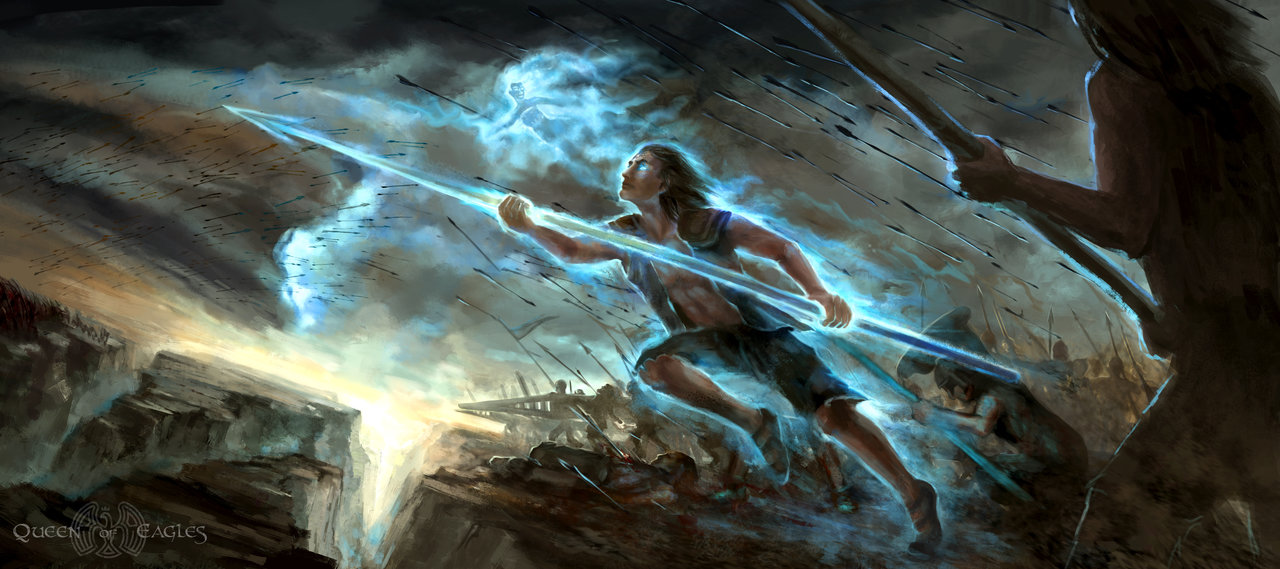
We all have our problems. I’m full of them, and it seems like they just keep coming. Sometimes, we’re tempted to look at others and think, “Wow, that person has a perfect life. They are so lucky.” Take Kaladin, for instance. He’s a Windrunner. He can storming fly! He has everything a man could want. So why does he walk around full of burning, unresolved passion? He hurts. He wants to be set free, but his duties practically consume him. He has to help others, no matter what. But when the time comes for him to accept help? That’s where things get difficult.
I’m a lot like that. I hate asking for help. Being without a job for the last four months (going on five) has been difficult, and not just because I’m not working. The difficulty comes in accepting help from others. I’ve gotten better at it, but storms, has it been difficult. Depression has never been an easy thing to live with, and Kaladin’s sense of duty embodies what it’s like to want to work hard and be strong. But the debilitating self-loathing and persistent memories of past failures–both recent and ancient–threaten his very existence. Having the power of the gods doesn’t make him immune from such feelings. His sullen existence speaks mountains to me. And yet, on he fights, day after day, storm after storm, doing his best to make the world a better place with the resources he’s granted. For someone who comes off so strong to those on the outside, his inner being is much like a castle made of sand, just waiting for the tide to come in and wash it away. There are far too many days when I feel like my sandcastle has been eradicated, leaving me with a shell that might break at any moment. Kaladin’s strength is no greater than my own. It’s all about perspective, determination, and the bond of something greater.
Dalinar Kholin
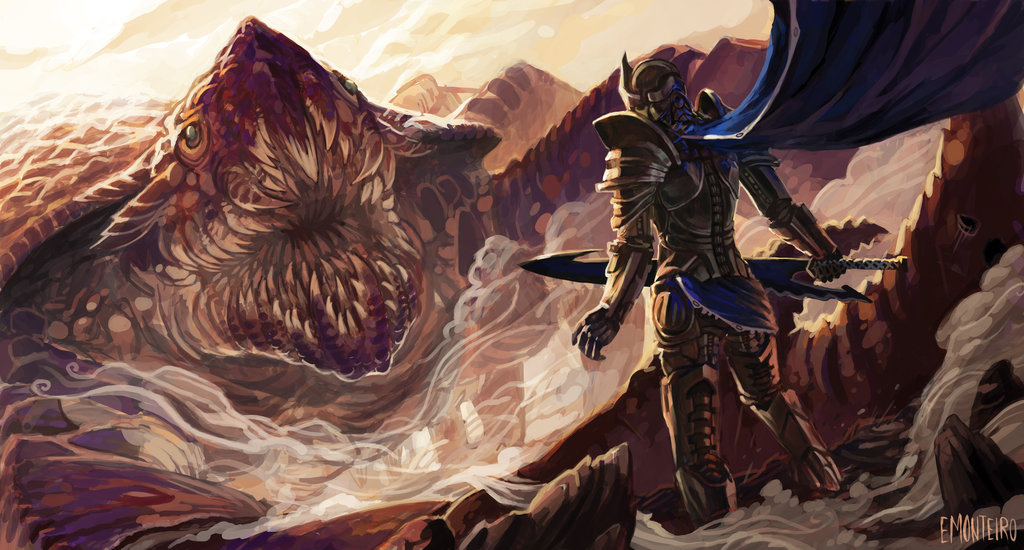
Next up we have Dalinar. The Blackthorn, known for his unrelenting brutality, wants to make amends and do better. But his past haunts him. How can he ever hope to be free from his pain? He tries oh-so hard to do what’s right, but that doesn’t keep him from wanting to turn to the strongest drinks in order to forget his pain. Does he stumble? Yes. Does he revert to his old habits? A bit, yes. But does he come out of it? You betcha. As Dalinar is reminded time after time, it’s not the destination that’s important, it’s the journey.
Life before death. Strength before weakness Journey before destination.
He may have been a blood-thirsty man in times past, but each step of his life-long journey has brought him closer to the man he wishes to become, the man he needs to become. Some people, such as Navani, already see him as that man. So why doesn’t he see that of himself? It’s difficult to see who you really are until faced with a seemingly insurmountable trial or obstacle. When Dalinar is pressed to the point of breaking, his strength shows through. He doesn’t give in. He defeats his demon.
We all have demons, and most of the time it’s easy to let it take us, to say, “I’m too weak. I can’t do this.” But that’s not the case, is it? You are that strong, and you can do it. You can face your demons and drive them back into the darkness.
And so can I.
The Lightweaver
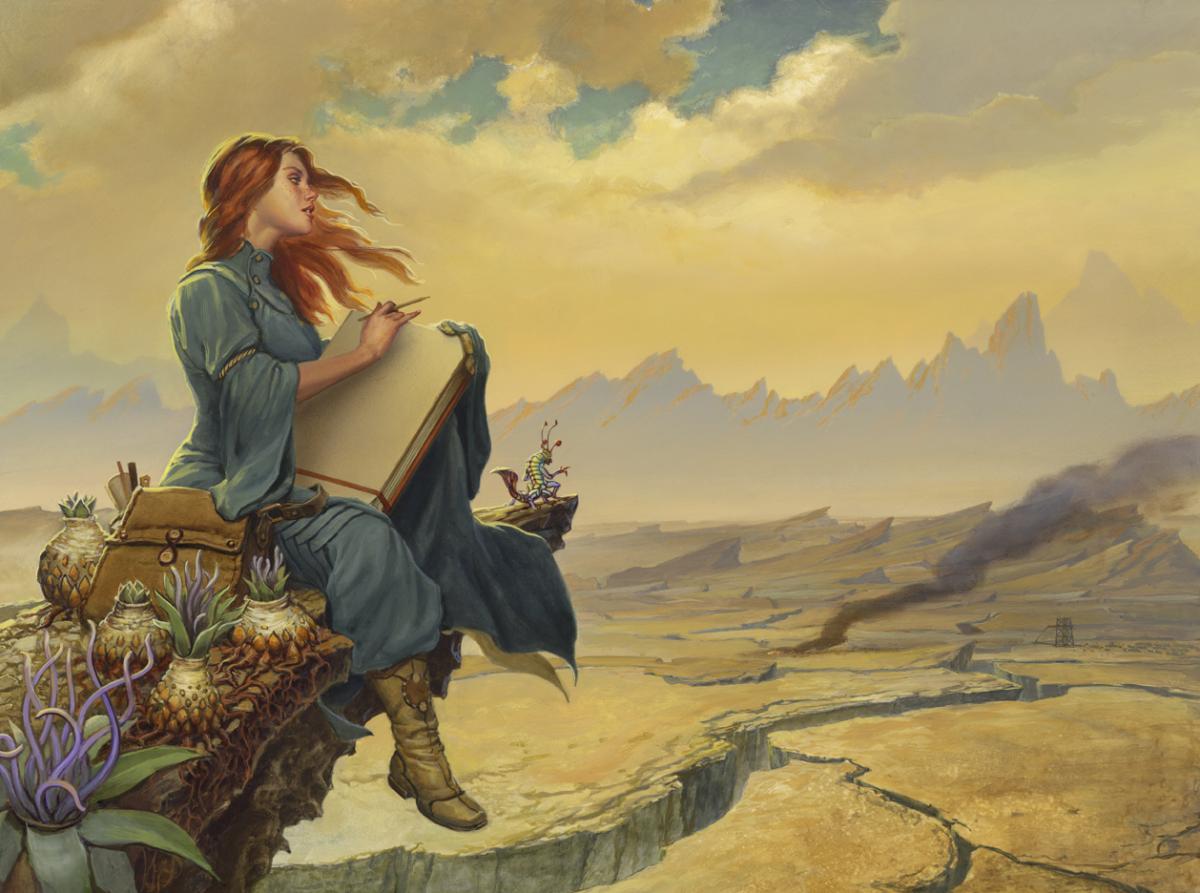
Shallan. Oh, Shallan. So unsure of herself. Why can’t she just be more like Veil, or Radiant, or…anyone but who she is? Other people handle situations so much better than she does. At least, that’s what she thinks. And so she constructs multiple versions of herself, versions who are much more adept at specific parts of life. Some are bold, daring. Others logical and smart.
The personas we put on around others can be fun and liberating, but what people want to see the most is the real us. Can we put on a face in order to get through a difficult situation? Of course. In fact, sometimes it’s necessary. It’s when we give ourselves up to that constructed persona that we begin to lose ourselves. The irony is, that person is already inside of us. It can take time, practice, and a lot of uncomfortable moments to make those attributes more natural to us, but the fact is that we can rise to the occasion. We can be the person we need to be in any situation. Shallan’s identity crisis is not new to me, nor is it new to you (if it is, then I congratulate you and envy you). There’s a reason I find so much joy in writing and improv comedy. It allows me to portray someone who I’m not. Or, rather, someone who I think I’m not. Don’t get me wrong, acting and creating fictitious worlds is a wonderful thing; the problem arises when we let those things consume us and make us forget who we really are.
I Will Protect…
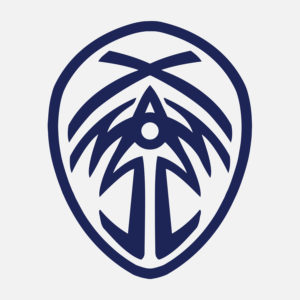
Teft, while not a main character, probably had the most to say to me during his limited time as a point-of-view character. (Remember, there are spoilers for Oathbringer ahead, so read at your own risk.) Teft’s drug addition left him reeling. His comrades had to pick him up out of the alleys and bring him back to the barracks, night after night. The man hated himself. And I get that.
While I don’t feel like I have any addiction, I do relate to the self-loathing Teft has for himself. One small failure can put me into a downward spiral of “I’m not good enough,” and “I’ve failed,” coupled with questions like “What is wrong with me?”. It’s a brutal life, living like that. Goodness knows I’ve done it for some time. Teft stopped feeling like he belonged in Bridge Four. He didn’t think the other bridgemen should accept him for who he is. Me? Well, I make mistakes and wonder how my wife can still love a failure such as myself. I berate myself so much that I believe the horrible things I tell myself. And then the darkness leaves me and I’m left wondering how I ever got to that state in the first place.
Well, Teft is a better man than I am (and if someone could please help him see that, I would appreciate it). If there is one line in this entire book that needed to be in there, it’s when Teft was struggling to say–or not say, rather–the Words to become a full Knight Radiant. How could he help others when he couldn’t even help himself? How could he, an addict, protect people he hated, when it was he himself he hated the most? Well, he finally realized what needed to be done and spoke the Third Ideal, but with one addition that has helped me more than anything. He said, “I will protect even those I hate, even if the one I hate most is myself.” (Emphasis added.)
I can’t begin to describe how deep that hit me. There are so many times that I can’t stand to be in my own skin. I know, deep down, that those thoughts are put there by Odium, but in the moment they’re so real. The feelings are more real than anything I’ve ever felt. I hate myself, and I hate what I do. Thankfully, medication has helped alleviate much of those feelings, but that doesn’t mean they don’t still make an appearance. But Teft, now there’s a man who knows what’s up. Speaking an Oath to protect those he hates, even if that means himself, was one of the most powerful things I’ve read. Like Teft and Kaladin Stormblessed, I have to live with myself, whether I want to or not. When the darkness comes to me, those around me see the Illusions I put on, much like those of Shallan. And, like Dalinar, the past can haunt me (even if there’s no need for it). But Teft is right. If I want to be Radiant, then I need to protect everyone, including those I hate. And that includes me, even when I feel like I least deserve it.
Strength Before Weakness
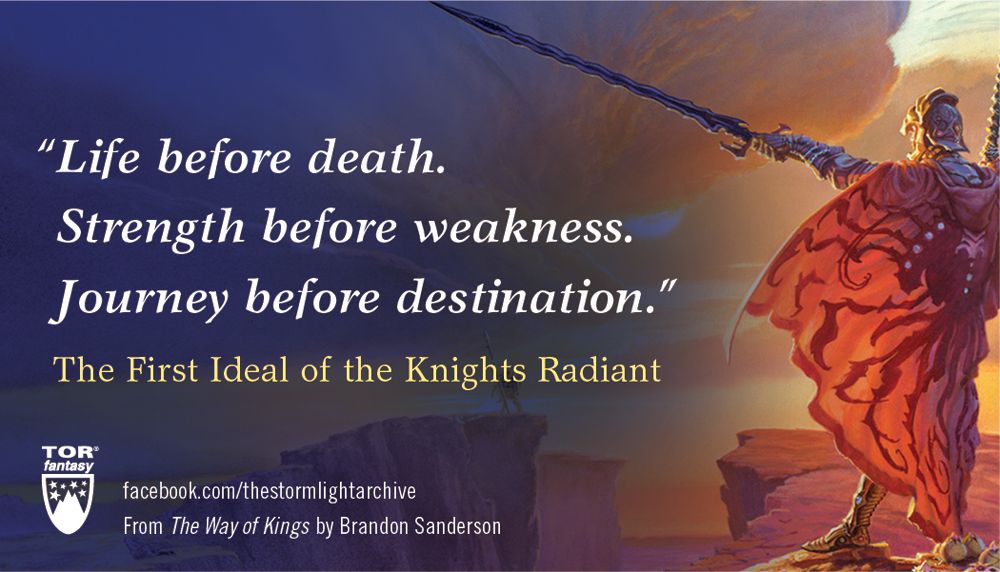
Oathbringer is an exciting, exhilarating ride from start to finish. The battles, the intrigue, and the growing doom makes this behemoth of over 1,200 pages a journey nearly impossible to put down. (Yes, I understand it has taken me four months to read it; I’ve been busy. Really busy.) Even with the brilliance of the prose and plot, the thing that will stick with me the longest is how Kaladin, Dalinar, Shallan, Teft, and others fought their demons, pushed through the darkness (even if that darkness hasn’t completely left), and fulfilled their duty. Thankfully, I don’t have a planet to save. But I do have myself, my family, and those around me to build up. Despite my flaws, my insecurities, and my imperfections, there is nothing I cannot do.
Life before death. Strength before weakness. Journey before destination.
